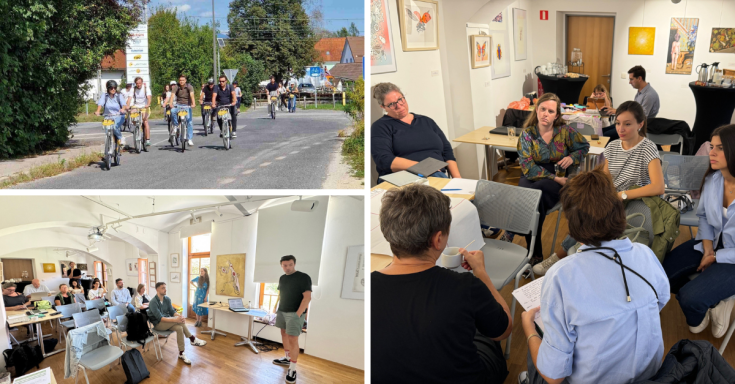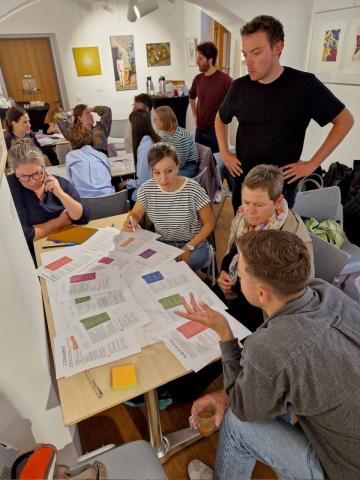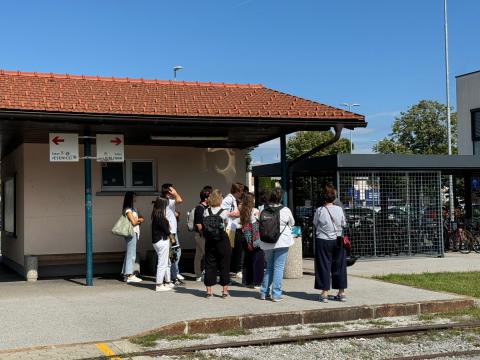Hands-on for the SMAPE summer academy in Ljubljana

The Shared Mobility Action Programmes Exchange (SMAPE) consortium gathered for a Summer Academy in Ljubljana to immerse themselves in several days of collaborative work. The project partners were able to work on developing their policies thanks to various workshops where they could share their ideas, as well as the different challenges in developing shared mobility policies and services.
What is a Summer Academy and why for SMAPE?
Summer academies are informal, immersive events offering an intensive collaboration, learning, and networking environment. Typically spanning several days, these academies bring together professionals from across sectors to explore key topics, share experiences, and foster a hands-on approach. They contribute significantly to large-scale projects like SMAPE by facilitating open dialogue and innovative thinking outside the formal confines of meetings and conferences. In this case, the SMAPE Summer Academy offered partners the opportunity to exchange best practices and reflect on the lessons learned from shared mobility initiatives across Europe, using Ljubljana’s mobility infrastructure as a living case study.
What we discuss?
The summer academy hosted several in-depth workshops focusing on different topics. Autodelen.net organised a workshop on diversity, inclusivity, and equal access to shared mobility. Participants explored how shared mobility could address the mobility needs of underserved communities, including low-income groups, people with disabilities, and those living in areas with limited transport options. Discussions revolved around ensuring that shared mobility services cater to a wide spectrum of users, regardless of socio-economic background or physical ability, and removing barriers to access. Case studies and real-world examples were shared, highlighting both the challenges and successful strategies used to create equitable mobility systems across different regions. Autodelen.net was also in charge of setting the table to discuss the Interregional Policy Evaluation Report. This report is a synthesis of the state-of-play reports, best practices register and the upcoming joined methodology. Participants shared their views of what elements should be included to make this report insightful for them, but also for local and regional authorities working on the topic. The day concluded with a visit of the different shared mobility solutions in the city of Ljubljana.

The second day, was led by the University of West Attica. There, participants delve into the Impact Assessment and economics of shared mobility. This session was designed to help participants understand the economic implications of shared mobility and the importance of assessing its impact on urban environments. The workshop explored various frameworks and methodologies to evaluate the benefits, costs, and long-term sustainability of shared mobility solutions. Participants engaged in discussions on how shared mobility affects local economies reduces transportation costs, and contributes to environmental goals such as lowering carbon emissions. In addition to theoretical insights, the University of West Attica introduced a practical tool for measuring the impact of shared mobility solutions. This tool was designed to help cities and policymakers assess the effectiveness of shared mobility initiatives based on key features, such as usage rates, service accessibility, environmental impact, and user satisfaction. Afterwards, the consortium moved to the different locations of the new e-bike sharing system and embarked on a trip in the urban region, experiencing first-hand how shared mobility functions within Ljubljana’s peri-urban landscape.

The final day included a citizen engagement workshop led by POLIS, focusing on the importance of citizen engagement in the promotion of shared mobility solutions. The workshop emphasised how citizen involvement is crucial for the successful implementation and long-term adoption of shared mobility options, both when adopting the policies and nudging citizens. With an exercise based on developing engagement plans for fictional cities, based on the Interreg Europe project e-SMARTEC handbook, partners were able to rethink their engagement strategies and learn from their peer's actions.
Looking towards the future of shared mobility and SMAPE
The SMAPE Summer Academy created a dynamic space for participants to reflect on lessons learned and chart the future course for shared mobility policies. Central to these discussions was the Interregional Policy Evaluation Report, which was reviewed in depth during the event. This report, a comprehensive assessment of shared mobility practices across regions, highlights both achievements and challenges, offering concrete recommendations for future improvements. Its findings will play a crucial role in shaping upcoming policy decisions, ensuring shared mobility systems are more inclusive, efficient, and responsive to local needs.
